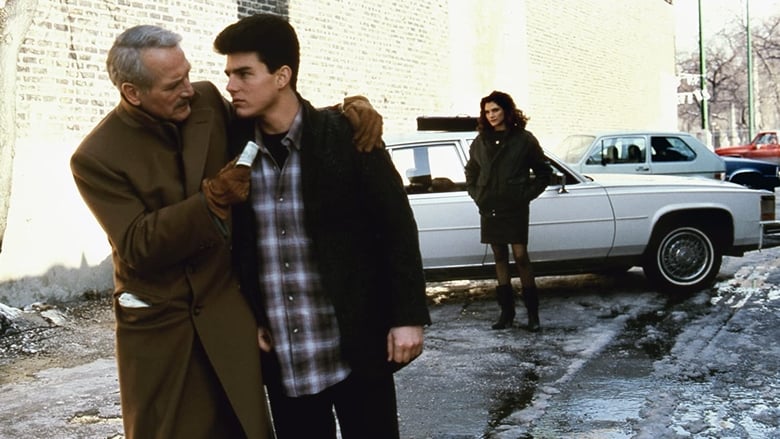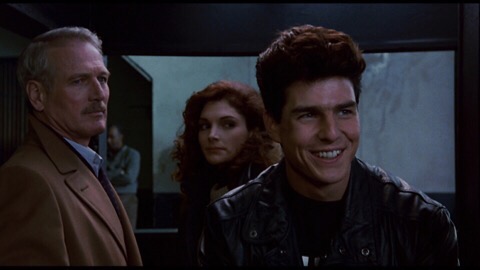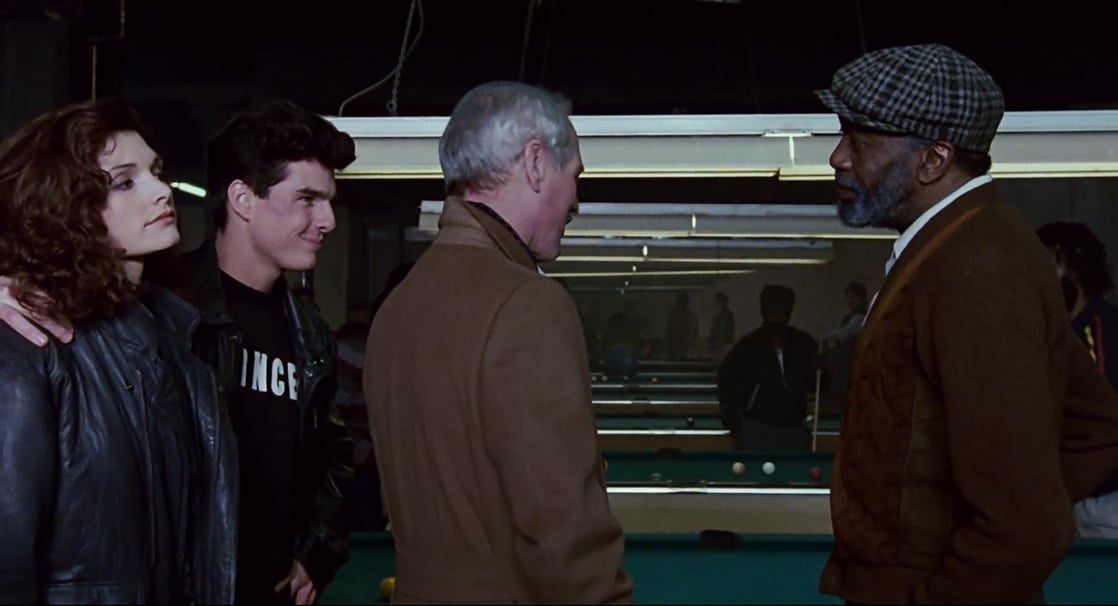← Back to Reviews

in
The Color of Money
After six previous Oscar nominations and being awarded a Lifetime Achievement Oscar, the late Paul Newman finally won his only competitive Oscar for his 100 megawatt performance in 1986's The Color of Money, an in-name-only sequel to The Hustler that provides a compelling story with fascinating lead characters that doesn't rely on the legacy of the first film.

It's 25 years after The Hustler when we find Eddie Felson has settled into a comfortable existence as a liquor salesman who has left pool behind him, but all that changes when he meets Vince Lauria (Tom Cruise), a dumb-as-a-box-of-rocks beast on the pool table and his smart and sexy girlfriend, Carmen (Mary Elizabeth Mastrontonio). Eddie sees a way back into the game by mentoring Vincent so that he can participate in an important tournament in Atlantic City. Unfortunately, as deadly as Vince is at the pool table, he is totally clueless about the art if the hustle and fights Eddie's training tooth and nail.

The Oscar nominated screenplay by Richard Price is vividly smart and quietly evocative, establishing the Eddie Felson as a new character who had never been featured in another film. There are no flashbacks to the events of the first film and the only hints we have of Eddie's previous cinematic past are through other characters who knew Eddie back in the day and are shocked to see him mentoring Vincent. Eddie doesn't talk about why he stopped playing pool until about 35 minutes into the running time. We don't really get insight into the Eddie of the first film until the heartbreaking scene where Eddie realizes he has been hustled.

It is Martin Scorsese's direction that is the greatest tool in constructing the strongest element of the film and that is the relationship between Eddie, Vince, and Carmen. It is so much fun watching Eddie initially play Vince and Carmen until he realizes that Carmen is the brains of the duo and decides to use that to his and, eventually to Vince's advantage. Scorsese's camerawork lays bare the relationship between Carmen and Vincent and shows it being bent but never broken.

The film is handsomely mounted, including some superb editing by Scorsese's long time editor Thelma Schoonmaker and Robbie Robertson's music frames the story perfectly. Even though Newman has done better work, it was nice to see the Academy finally recognize Newman after all those years and Mastrontonio's rich performance earned her a supporting nomination as well. Cruise completely invests in a character who isn't terribly bright and wears all of his emotions on his sleeve, which was a real departure for the actor and he never allows Newman to blow him off the screen either. Newman and Scorsese fans will find a lot to love here.
After six previous Oscar nominations and being awarded a Lifetime Achievement Oscar, the late Paul Newman finally won his only competitive Oscar for his 100 megawatt performance in 1986's The Color of Money, an in-name-only sequel to The Hustler that provides a compelling story with fascinating lead characters that doesn't rely on the legacy of the first film.

It's 25 years after The Hustler when we find Eddie Felson has settled into a comfortable existence as a liquor salesman who has left pool behind him, but all that changes when he meets Vince Lauria (Tom Cruise), a dumb-as-a-box-of-rocks beast on the pool table and his smart and sexy girlfriend, Carmen (Mary Elizabeth Mastrontonio). Eddie sees a way back into the game by mentoring Vincent so that he can participate in an important tournament in Atlantic City. Unfortunately, as deadly as Vince is at the pool table, he is totally clueless about the art if the hustle and fights Eddie's training tooth and nail.

The Oscar nominated screenplay by Richard Price is vividly smart and quietly evocative, establishing the Eddie Felson as a new character who had never been featured in another film. There are no flashbacks to the events of the first film and the only hints we have of Eddie's previous cinematic past are through other characters who knew Eddie back in the day and are shocked to see him mentoring Vincent. Eddie doesn't talk about why he stopped playing pool until about 35 minutes into the running time. We don't really get insight into the Eddie of the first film until the heartbreaking scene where Eddie realizes he has been hustled.

It is Martin Scorsese's direction that is the greatest tool in constructing the strongest element of the film and that is the relationship between Eddie, Vince, and Carmen. It is so much fun watching Eddie initially play Vince and Carmen until he realizes that Carmen is the brains of the duo and decides to use that to his and, eventually to Vince's advantage. Scorsese's camerawork lays bare the relationship between Carmen and Vincent and shows it being bent but never broken.

The film is handsomely mounted, including some superb editing by Scorsese's long time editor Thelma Schoonmaker and Robbie Robertson's music frames the story perfectly. Even though Newman has done better work, it was nice to see the Academy finally recognize Newman after all those years and Mastrontonio's rich performance earned her a supporting nomination as well. Cruise completely invests in a character who isn't terribly bright and wears all of his emotions on his sleeve, which was a real departure for the actor and he never allows Newman to blow him off the screen either. Newman and Scorsese fans will find a lot to love here.
